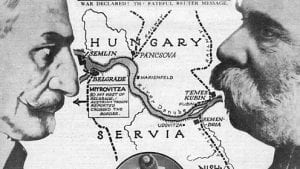3. Identifies examples of a vast difference between worldviews (beliefs, views, motivations) prevalent today and those more common in the past.
The Austria-Hungarian Ultimatum
The ultimatum produced by Austria Hungary on 23rd of July, 1914, was a direct result of the assassination of the Archduke Franz Ferdinand and his wife, Sophie, the duchess of Honenburg. Both were heir to the Austrian-Hungarian throne, and their assassinations is what many believe to be the cause of this ultimatum. While much of this is remains true, in present day society, the reasons and motivations could be very different to what was that in those days.
The major difference between present-day society and pre-world war society, is the presence of monarchies and hierarchies. In today’s western beliefs, having a rank-based system would seem uncommon, which would therefore lower the chances of an international conflict based off one life. However, in western society today, many of the conflicts stem from personal agendas or political issues. In a case such as this one, the ultimatum given by Austria-Hungary would be purely based off political gain.
Although pre-world war conflicts had similarities to present-day conflicts, there are still differences in motives, and an example of this would be land and/or imperialism. In this case, this ultimatum was given to Serbia with the intent that Serbia would refuse, thus allowing Austria-Hungary and its ally, Germany, to declare war on Serbia and defeat them in order to gain the land they had, and access to many other countries that could give them benefits.
The differences are prevalent all the time. It is apparent that a modern-day ultimatum like this would be issued in hopes of submission by the opposing side, which would make it easier to politically dominate over said country. With that being said, pre-world war society, like Austria-Hungary, issued ultimatums in hopes for disagreement, so that they could justifiably attack the opposing side in order to gain control of their benefits.

http://dingeengoete.blogspot.com/2015/07/this-day-in-world-war-1-history-july-23.html
wow, I agree that the ultimatum was sent in hope to start a war. I love the image at the end! Nice blog post, very informing!
This was a good evaluation of the Austrian-Hungarian ultimatum due to its inclusion of specific dates and leaders involved. Your section regarding the monarchy system was helpful, as the reader is able to understand the significance of the assassination through a political perspective. The conclusion wrapped up the article well and offered points that weren’t necessarily a repetition of the introduction.
Nice job Khosi!
The post starts off with a focused and relevant objective. To what extent do you think that objective was achieved?
Some claims seem to be based on speculation or assumption. What specific evidence might be included to support the claims and show understanding of historical perspective? How might structure be maximized to fully address the objective outlined in the beginning?